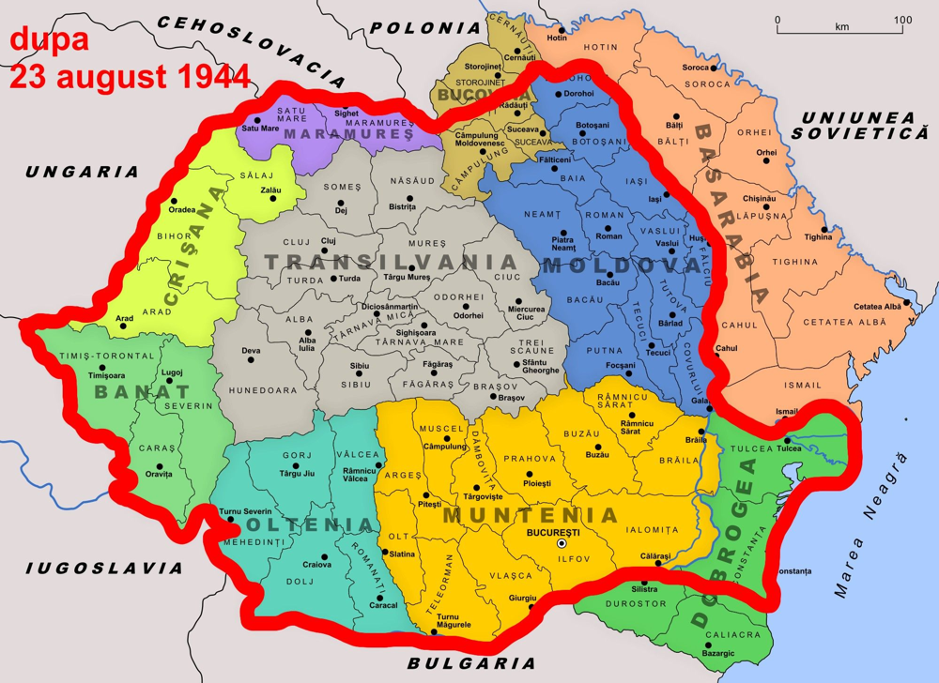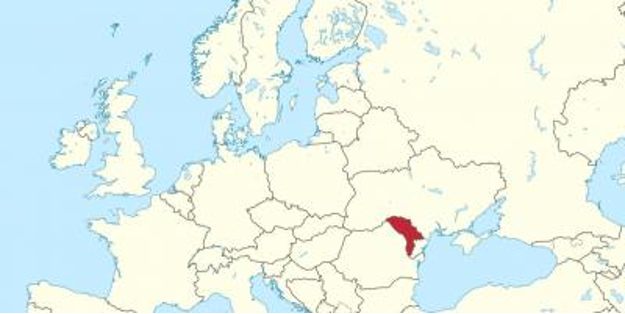Annexation of Bessarabia to the USSR
- Ariana Elena
- Mar 4, 2021
- 6 min read
Updated: May 4, 2021
English version
Article by Carmen Sylva
The Republic of Moldova, a territory populated, for the most part, by Romanians, is located in the eastern part of the Prut River. This territory is also known as Bessarabia, a part of the Principality of Moldova, located between the Prut and the Dniester. In 1812, the authorities of the Russian Empire decided to occupy this territory and use the name Bessarabia. put the name on the whole territory, in order to "inform" the rest of Europe that the Bessarabian people had nothing in common with the Romans.
In the tsarist period (1812-1917) Bessarabia went through suffering and sacrifice. On March 27, 1917, after a majority vote of the Administration of this Government, which fully expressed the will of the population, it united with the newly constituted state: Romania.
However, the population of this territory could not enjoy a long time of union, because, on August 23, 1939, an agreement was signed in Moscow by Germany and the Union of Soviet Socialist Republics. This pact, together with the provisions of its secret additional protocol, generated conflicts, suffering, dramas and the destabilization of the politico-military situation in Europe, from the Gulf of Finland to the Black Sea. This document, called The Ribbentrop-Molotov Pact, was, in fact, a sign of collaboration between the Soviet Union and Germany. The most surprising thing in this pact would be the secret annexation, conceived by these two states, to divide Eastern Europe, ensuring either the disappearance of some states or their division. Thus, Poland disappeared completely, being again divided between the USSR and Germany, the Baltic countries were forced to submit to Soviet control, and the region of Karelia, once part of Finland, was given to the Soviet Union.
On June 26 and 27, 1940, the secret agreement of Stalin and Hitler was revealed, through the occupation and invasion of Bessarabia, northern Bukovina and Herta, against the will of the people.
Northern Bukovina, an ancient Romanian territory, was not part of the Ribbentrop-Molotov Pact but was mentioned in the Soviet ultimatum of 1940. The title of this locality is unique in history, not belonging to either Ukraine or Russia, receiving the title of "compensation".
Herta territory, which was not mentioned in either the Ribbentrop-Molotov Pact or the Soviet ultimatum, was occupied only later by the army.
On June 28, 1940, the Romanian government declared that in order to avoid a war, the people of northern Bukovina and Bessarabia must evacuate immediately. In fact, Romania did not cede these two provinces, only evacuated them under threat.
To crush the annexed territory even more, by placing its parts of the North and Sub, under the administration of Ukraine, forcibly denationalizing the provinces inhabited by the Romanians.
From June 28 to July 4, 1940, in the counties of Chernivtsi, Cetatea Alba, Balti and Chisinau, more than a thousand people were arrested, most of them intellectuals, for example, teachers and students. On the night of June 13, 1941, about 5,000 families were deported from Bessarabia, now called the Republic of Moldova. In August alone, in the lower counties of Bessarabia, more than 50,000 young people were sent to forced labour in the remote region of the Soviet Union, and from 1944 to '49, another 80,000 of them did not work. have they ever returned.
From 1946-47, after the Soviet famine, about 200,000 Bessarabians died. On the night of June 5-6, 1949, about 11,000 peasant families from Bessarabia were arrested and deported to Siberia.
The States of Europe, on December 24, 1989, condemned the signing of this protocol by the Soviet Union and its secret agreement with Germany and acknowledged that they were, from a legal point of view, invalid at the time of their signing, contradicting sovereignty. these states. In the light of these statements, the participants in the First International Conference dedicated to analyzing the consequences of the Ribbentrop-Molotov Pact discussed the general human values of freedom and considered that the consequences of the Covenant should be eliminated. At a conference in Chisinau, participants stated that they were in favour of eliminating the acts of injustice and abuse committed, even after World War II.
In conclusion, the Ribbentrop-Molotov Pact, made between the two totalitarian regimes of Europe, will go down in history as the act by which the Stalinist and Hitlerist systems planned their expansion, annexing and dividing people and territories.

(Note: Map showing Romania after 1944, excluding the territories given to the USSR, Ukraine and Bulgaria)
Romanian version
Anexarea Basarabiei la USSR
Article scris de Carmen Sylva
Republica Moldova, teritoriu populat, in mare parte, de romani este situat in partea de est a râului Prut. Acest teritoriu este cunoscuta si cu numele de: Basarabia, o parte a Principatului Moldovei, situat intre Prut si Nistru. In 1812, autoritățile Imperiului Rus, au decis sa ocupe acest teritoriu si sa utilizeze numele Basarabia. pună numele pe tot teritoriul, pentru a „informa” restul Europei ca poporul basarabesc n-avea nimic in comun cu romanii.
In perioada țaristă (1812-1917), Basarabia a trecut prin suferințe si sacrificii. Pe 27 martie 1917, după un vot majoritar al Administrației al acestei Gubernii, care exprima de plin voința populației, s-a unit cu statul nou constituit: Romania.
Totuși, populația acestui teritoriu nu a putut sa se bucure mult timp de unire, deoarece, pe 23 august, 1939, un acord a fost semnat la Moscova de către Germania si Uniunea Republicilor Sovieticilor Socialiste. Acest pact, împreuna cu prevederile protocolului sau adițional secret, au generat conflicte, suferințe, drame si destabilizarea situației politico-militare din Europa, de la Golful Finic pana la Marea Neagra. Acest document, numit Pactul Ribbentrop-Molotov, a reprezentat in realitate, un semn de colaborare Uniunii Sovietice si a Germaniei. Cel mai surprinzător lucru, in acest pact, ar fi anexarea secreta, gândita de aceste doua state, pentru a împarți Europa de Est, asigurând fie dispariția unor state, fie împărțirea lor. Astfel, Polonia a dispărut complet, fiind din nou împărțita intre USSR si Germania, tarile baltice au fost forțate sa se supună controlului Sovietic, iar regiunea Carelia, odată parte din Finlanda, a fost data Uniunii Sovietice.
Pe 26 si 27 iunie, 1940, înțelegerea secretă a lui Stalin si a lui Hitler, a fost dezvăluita, prin ocuparea si invazia Basarabiei, a Nordul Bucovinei si a ținutul lui Herta, împotriva voinței populației.
Nordul Bucovinei, străvechi teritoriu romanesc, nu a făcut parte din Pactul Ribbentrop-Molotov, dar a fost menționat in ultimatumul Sovietic din 1940. Titlul acestei localități este unic in istorie, neaparținând nici Ucrainei, nici Rusiei, primind titlu de „despăgubire”.
Teritoriul Herta, care nu a fost menționat nici in Pactul Ribbentrop-Molotov, nici din ultimatul sovietic, a fost ocupat numai după aceea, de către armata.
Pe 28 iunie 1940, guvernul roman a declarat ca pentru a evita declanșarea unui război populația din Nord Bucovina si Basarabia trebuie sa se evacueze imediat. De fapt, Romania nu a cedat aceste doua provincii, numai le-a evacuat sub amenințare.
Pentru a fărâmița teritoriul anexat si mai mult, prin punerea parților lui de Nord si Sub, sub administrarea Ucrainei, deznaționalizând forțat provinciile locuite de romani.
Din 28 iunie pana pe 4 iulie, 1940, in județele: Cernăuți, Cetatea Alba, Bălti si Chișinău, au fost arestate peste o mie de persoane, din care majoritatea erau intelectualii, de exemplu: profesorii si studenții. In noaptea de 13 iunie 1941, circa 5000 de familii au fost deportate din Basarabia, acum numita Republica Moldova. Numai in luna august, in județele de jos a Basarabiei, peste 50 mii de tineri, au fost trimiși la munca forțata, in regiunii îndepărtate ale Uniunii Sovietice, iar din 1944 pana in ’49, alte 80 mii mulți dintre ei care nu s-au mai întors vreodată.
Din 1946-47, după foametea Sovietica, circa 200 de mii de basarabeni au murit. In noapte de pe 5 spre 6 iunie, 1949, au fost arestați si deportați către Siberia circa 11 mii de familii de țărani din Basarabia.
Statele Europei, pe 24 decembrie 1989, condamnă semnarea acestui protocol, de către Uniunea Sovietica si înțelegerea sa secreta cu Germania, si au recunoscut ca acestea sunt, din punct de vedere juridic, lipsite de valabilitate in momentul semnării lor, veninând in contradicție cu suveranitatea acestor state. In lumina acestor declarații, participanții la prima Conferință Internațională dedicata analizării consecințelor Pactului Ribbentrop-Molotov, au discutat despre valorile general umane ale libertății si considera ca consecințele Pactului trebuie eliminate. La o conferință din Chișinău, participanți au enunțat ca sunt in favoarea de a elimina actelor de injustiție si abuz comise, după si in Războiul Mondial II.
In concluzie, Pactul Ribbentrop-Molotov, făcut intre cele doua regimuri totalitare ale Europei va rămâne cunoscut in istorie ca actul prin care sistemele staliniste si hitleriste, au pus in plan expansiunea lor, anexând si despărțind popoare si teritorii.

(Note: Map showing Bessarabia or the Republic of Moldova)
Sources:
Declaration from Chisinau at the International Conference (The Ribbetrop-Molotov Pact and its consequences on Bessarabia)
Images:
https://constantasimplicity.wordpress.com/2016/01/24/24-ianuarie-unirea-moldovei-cu-tara-romaneasca/




Comments